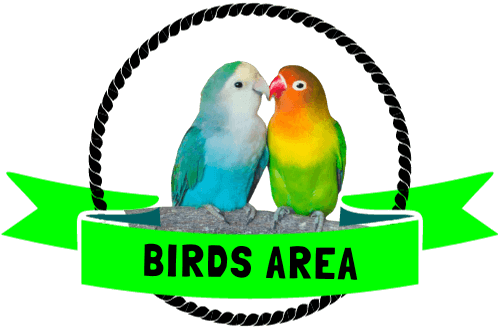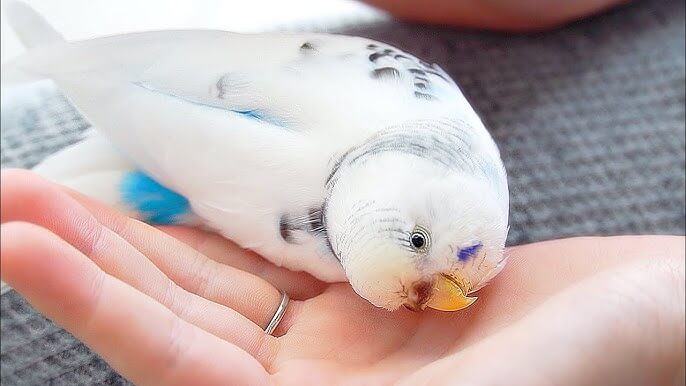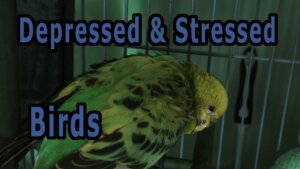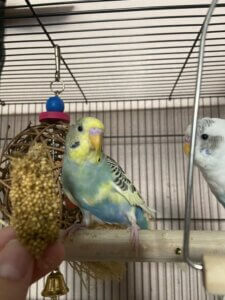Is My Budgie Having A Seizure? Signs and Solutions
A budgie having a seizure may exhibit uncontrolled shaking, loss of balance, and twitching. Immediate veterinary care is crucial.
Budgies, also known as parakeets, are small, active birds that can sometimes experience seizures. Recognizing the signs early is essential for their well-being. Seizures in budgies can be triggered by various factors such as nutritional deficiencies, infections, or toxins. Observing symptoms like uncontrolled shaking, loss of balance, and twitching can indicate a possible seizure.
Quick action and a visit to the vet can make a significant difference. Understanding these signs helps ensure your budgie receives the necessary care promptly. Always monitor your budgie’s behavior closely and consult a veterinarian if you notice any unusual symptoms.

Credit: www.reddit.com
Recognizing Seizures In Budgies
Budgies are delightful pets that bring joy to many homes. It is crucial to recognize if your budgie is having a seizure. Quick action can help ensure their well-being. Learn about the symptoms and behavioral changes to watch for.
Common Symptoms
Several symptoms indicate your budgie might be having a seizure. These signs can help you identify the problem early. Look for the following:
- Shaking or Trembling: Your budgie might shake uncontrollably.
- Falling Over: Your bird may fall off its perch suddenly.
- Unusual Movements: Look for jerky or erratic movements.
- Stiffness: The budgie might become rigid and immobile.
- Rapid Breathing: Notice if breathing becomes fast and shallow.
Behavioral Changes
Seizures can also cause behavioral changes in budgies. Recognizing these changes is vital:
- Lethargy: Your budgie might seem unusually tired or inactive.
- Disorientation: The bird may appear confused or lost.
- Vocalization Changes: Listen for unusual squawks or chirps.
- Appetite Loss: The budgie might stop eating or drinking.
- Fearfulness: Your pet may become more skittish or fearful.
If you observe any of these signs, consult a vet immediately. Quick action can make a difference in your budgie’s health.
Possible Causes
Understanding the causes of seizures in budgies can help you provide better care. Seizures can be alarming, but knowing potential triggers is the first step in addressing the issue. Let’s dive into some common causes of seizures in budgies.
Nutritional Deficiencies
A balanced diet is crucial for your budgie’s health. Poor nutrition can lead to various health issues, including seizures.
- Vitamin Deficiencies: Lack of Vitamin D, B6, or E can cause seizures.
- Mineral Imbalances: A deficit in calcium or magnesium may trigger seizure activity.
- Poor Diet: Feeding seeds alone is inadequate. Budgies need fruits, vegetables, and pellets.
Ensure your budgie’s diet is rich in essential vitamins and minerals. Consider consulting a vet for a proper diet plan.
Genetic Factors
Some budgies are more prone to seizures due to their genetic makeup. Identifying genetic factors can be challenging but is essential for long-term health.
- Inherited Conditions: Certain budgies inherit a predisposition to seizures.
- Family History: Check if the budgie’s parents had similar issues.
- Breeding Practices: Inbreeding can increase the risk of genetic disorders.
If you suspect a genetic cause, talk to a veterinarian for specific tests and advice.
Immediate Actions
Seeing your budgie having a seizure can be terrifying. Knowing what to do immediately is crucial for your pet’s safety and well-being. Follow these steps to ensure the best care for your budgie during this critical time.
Ensuring Safety
First, keep your budgie safe. Remove any sharp objects nearby. Softly place your hand over the bird without squeezing. This prevents injury during the seizure.
Next, move your budgie to a quiet, dim area. Noise and bright lights can worsen the seizure. Make the environment calm and safe.
Finally, avoid handling your budgie too much. Excessive movement can stress the bird more. Limit interaction to only what’s necessary for safety.
Reducing Stress
Keep the environment calm. Turn off loud music or TV. Speak softly if you need to communicate.
Cover the cage with a cloth. This reduces visual stimuli and helps your budgie relax. Ensure the cloth is light and breathable.
Monitor your budgie’s behavior. Note the seizure’s duration and any strange actions. This information helps the vet diagnose the issue.
If the seizure lasts more than a few minutes, contact a vet immediately. Quick action can save your budgie’s life.
| Action | Description |
|---|---|
| Remove Sharp Objects | Ensure the area is free of hazards. |
| Move to Quiet Area | Reduce noise and light to calm the bird. |
| Limit Handling | Only touch the bird if necessary for safety. |
| Cover the Cage | Use a light cloth to reduce visual stimuli. |
| Monitor Behavior | Note seizure duration and actions for the vet. |
Long-term Care
Long-term care for a budgie with seizures is crucial. It requires consistent monitoring and adjustments to ensure the bird’s health. Small changes can make a big difference in your budgie’s life.
Diet Adjustments
Proper diet is essential for a budgie’s health. A balanced diet can help manage seizures. Include various seeds, fruits, and vegetables. Avoid foods high in fat and sugar. Offer fresh water daily. Use a clean water dish to prevent infections. A healthy diet supports the nervous system.
Regular Vet Visits
Regular vet visits are important. A vet can monitor your budgie’s condition. They can adjust treatments as needed. Early detection of issues can prevent severe problems. Schedule check-ups every six months. Ensure the vet specializes in birds. A specialist understands the unique needs of budgies.
Environmental Factors
Understanding the environmental factors that can affect your budgie’s health is crucial. Some environmental issues can cause seizures in budgies. It’s important to ensure their habitat is safe and suitable.
Cage Setup
The cage setup plays a vital role in your budgie’s well-being. Ensure the cage is large enough for your budgie to move freely. A cramped space can stress your budgie, potentially leading to health issues.
Place perches at different heights to promote exercise. Use natural wood perches to prevent foot problems. Avoid placing the cage in direct sunlight or drafts. Extreme temperatures can harm your budgie.
Noise Levels
Noise levels in your home can also impact your budgie. Loud noises can frighten and stress your bird. This stress can trigger seizures in sensitive budgies.
Keep the cage in a quiet area, away from televisions or speakers. Sudden loud noises, like fireworks or thunder, should be minimized. Consider using white noise machines to create a calming environment.

Credit: m.youtube.com
Medical Treatments
Dealing with a budgie having seizures can be very stressful. It’s crucial to understand the various medical treatments available. This section will focus on medications and therapies to help manage your budgie’s condition effectively.
Medications
Medications are often the first line of treatment for budgie seizures. A vet may prescribe anticonvulsants to control the seizures. Below is a table of common medications:
| Medication | Purpose |
|---|---|
| Phenobarbital | Reduces seizure frequency |
| Diazepam | Stops active seizures |
| Potassium bromide | Long-term seizure management |
Dosage and administration should follow the vet’s guidelines. Incorrect dosing can harm your budgie. Always monitor your budgie for side effects like lethargy or appetite loss.
Therapies
Therapies can complement medications. Below are some effective therapies:
- Diet Changes: Ensure a balanced diet with essential nutrients.
- Environmental Adjustments: Reduce stress by keeping the cage quiet and safe.
- Physical Therapy: Gentle exercises can improve overall health.
Nutritional supplements like calcium and vitamin D3 may be recommended. Regular vet visits are essential for monitoring progress.
Combining medications and therapies can provide the best outcome for your budgie.
When To Consult A Vet
It’s important to know when your budgie needs a vet. Sometimes, it might be urgent. Other times, regular check-ups are enough. Here’s a guide to help you decide.
Emergency Situations
Some signs mean you need a vet right away. If your budgie falls off its perch, it might be having a seizure. Other signs include:
- Shaking or trembling
- Loss of balance
- Unusual droppings
In these cases, call your vet immediately. Quick action can save your budgie’s life.
Routine Check-ups
Regular vet visits keep your budgie healthy. Even if your bird looks fine, a vet can spot hidden issues. Routine check-ups usually cover:
| Check-up Type | Frequency |
|---|---|
| Physical Exam | Once a year |
| Feather and Skin Check | Once a year |
| Diet Review | Every visit |
Regular check-ups help catch problems early. This ensures your budgie stays healthy and happy.
Preventive Measures
Ensuring your budgie’s well-being is vital to preventing seizures. By implementing preventive measures, you can create a safer and healthier environment for your feathered friend.
Healthy Diet
A balanced diet is crucial for a budgie’s health. Ensure they receive a variety of nutrients.
- Fresh Fruits and Vegetables: Provide apples, carrots, and spinach.
- High-Quality Seeds: Use a mix of seeds designed for budgies.
- Clean Water: Offer fresh water daily to keep them hydrated.
Avoid feeding your budgie avocado, chocolate, and caffeine. These can be toxic to birds.
Safe Environment
Creating a safe environment reduces stress and prevents injuries.
- Spacious Cage: Ensure the cage is large enough for movement.
- Perch Variety: Offer different sizes and textures for their feet.
- Avoid Hazards: Keep the cage away from direct sunlight and drafts.
Minimize loud noises and sudden movements around your budgie. These can cause stress and trigger seizures.
Regular check-ups with a vet will also help monitor their health. A well-cared-for budgie is less likely to experience seizures.
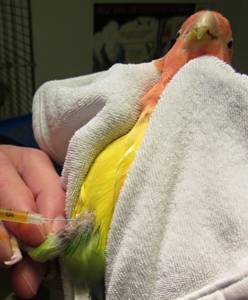
Credit: mickaboo.org
Frequently Asked Questions
What Are The Signs Of A Budgie Seizure?
Signs include twitching, loss of balance, and rapid wing flapping. Your budgie may also appear disoriented or have convulsions.
Why Is My Budgie Having Seizures?
Seizures can be caused by stress, nutritional deficiencies, or toxins. Consult a vet for an accurate diagnosis.
How Can I Help A Budgie During A Seizure?
Stay calm and ensure the budgie is safe. Reduce noise and gently cover the cage with a cloth.
Is A Vet Visit Necessary For A Budgie Seizure?
Yes, always consult a vet. Seizures can indicate serious health issues that need professional attention.
Conclusion
Recognizing a seizure in your budgie can be daunting. Always consult a vet for proper diagnosis and treatment. Early intervention can make a significant difference. Ensure a safe environment for your pet. Monitor their behavior closely for any unusual signs.
Your budgie’s health and happiness should always be a top priority.
